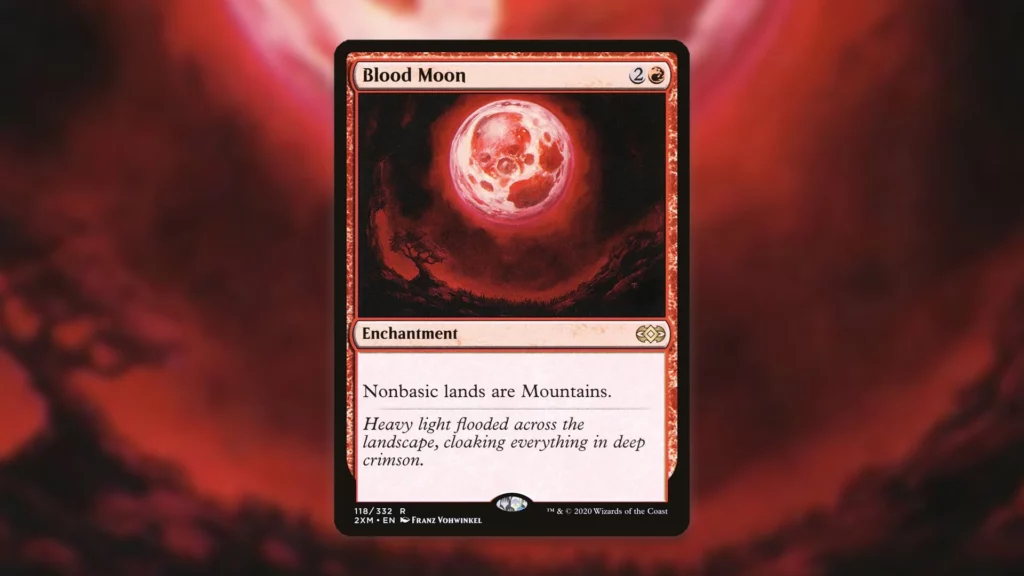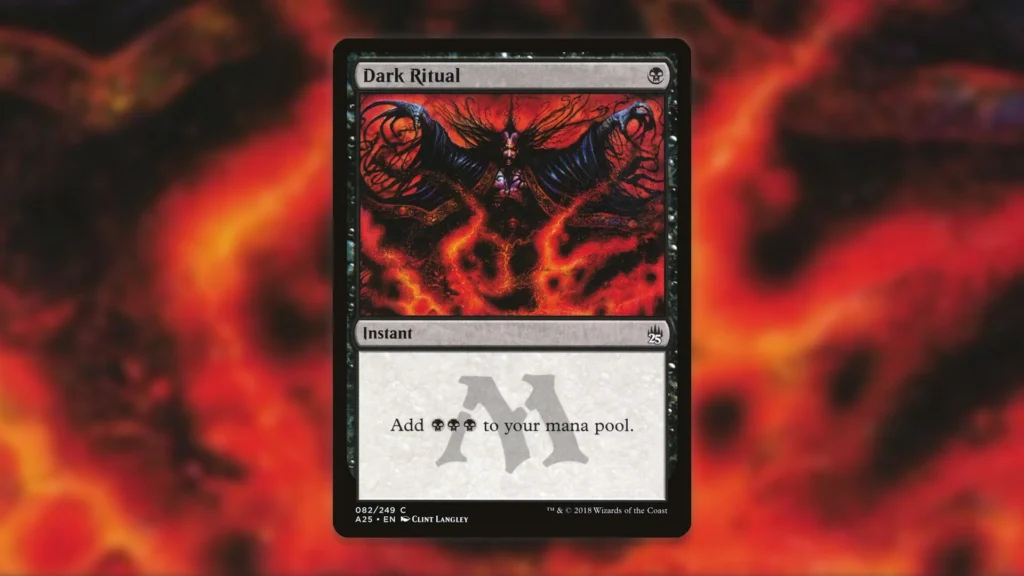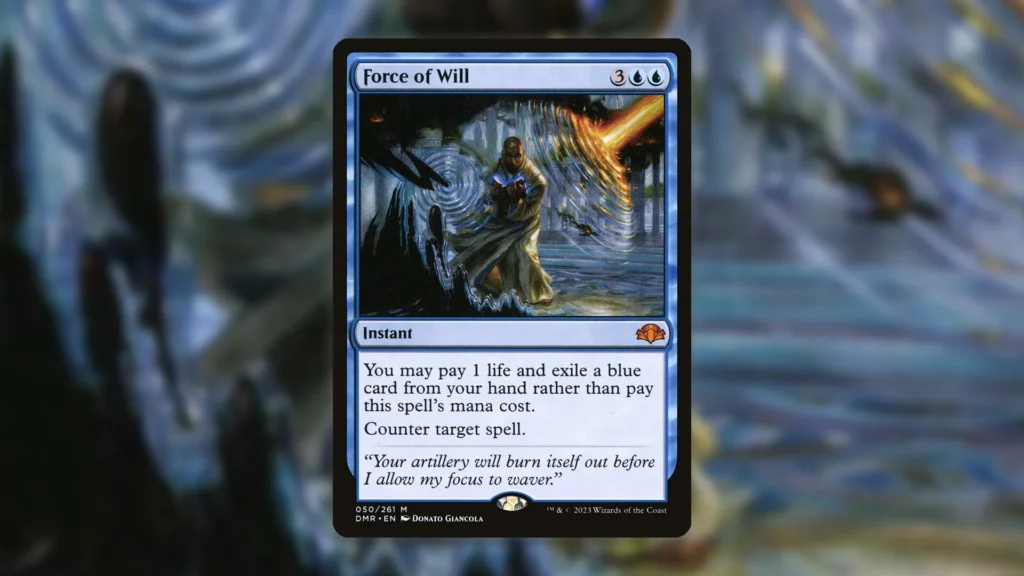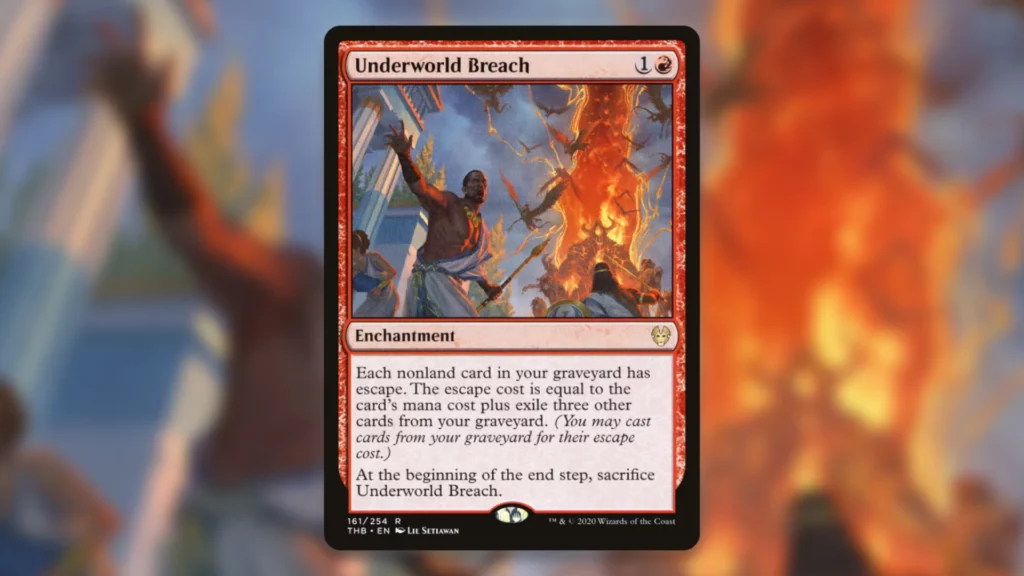Duel Commander has grown a lot in popularity over the past year. In addition to its continued popularity in France and other parts of the world, the format has been thriving on Magic Online, and big Duel Commander events have been held at events like MagicCon Las Vegas.
In an interesting turn of events, the format experienced a major ban announcement to four extremely powerful cards today. Every one of these cards sees significant tournament play in other formats, but the Duel Commander committee has deemed them worthy of receiving the banhammer here.
Blood Moon

The first card is none other than Blood Moon. Blood Moon is a really intriguing choice for a ban because, in theory, it serves an important role keeping greedy manabases in check. However, the committee mentioned a few key problems with the card in practice.
First, it’s an effective tool even against decks with few colors. This is largely because of the vast number of utility lands that nearly all decks are encouraged to run. This leads us to their second point, which states that constructing a manabase with the sole intention of playing around Blood Moon puts you at a disadvantage versus all the non-Blood Moon strategies that utilize a slew of utility lands.
In this sense, Blood Moon was banned because it “diminishes the strategic interest of games.” Other similar designs like Magus of the Moon remain legal as they’re easier to answer in general.
This decision certainly fits the committee’s goal of reducing the number of frustrating non-games, so it makes sense overall. Deadpool, Trading Card shells are already frustrating enough to play against, and having to try to navigate around Blood Moon only makes the experience worse.
Dark Ritual

In a similar vein, another staple of Deadpool decks in the form of Dark Ritual has also been banned. Dark Ritual is the type of card that can completely warp a game. The goal behind this announcement was to “improve gameplay experience” and having to face down Deadpool on turn two because your opponent began the game with Dark Ritual in hand isn’t exactly fun.
The committee mentioned that as more and more powerful cards have entered the format, tempo has become more important at large than card advantage. Dark Ritual is one of the strongest tempo elements left in the format. The fact that midrange Deadpool decks, Reanimator shells, and Storm strategies can all make incredible use of this card makes it ubiquitous, too.
Many other forms of mana acceleration, including Chrome Mox and even Lotus Petal, were already on the banlist. It felt like it was only a matter of time before Dark Ritual joined. Perhaps the dominance of Deadpool and Kefka, Court Mage was enough to raise alarms.
Force of Will

Force of Will is the third card to earn a ban, and the reasoning behind it is actually very similar to that of Dark Ritual. Once again, the point that tempo is more important than card advantage applies here.
Force of Will may look like a reactive card to hold opposing combo decks in check. The problem is that in most scenarios, the card is used proactively to protect broken plays. Aragorn, King of Gondor players are able to guarantee that their incredible Commander can resolve. From there, Aragorn provides a ton of card advantage that easily makes up for Force of Will’s downsides.
Meanwhile, Lier, Disciple of the Drowned players abuse Force of Will as a free piece of interaction to push forward their combo. The card disadvantage doesn’t matter if you win the game on the same turn. Other free, reactive pieces of counter magic, such as Force of Negation, remain fair game.
Underworld Breach

Lastly, we have Underworld Breach. Frankly, it’s a bit surprising this card has lasted this long in the format. Unlike the other cards getting banned today, Underworld Breach mostly goes into one archetype: Storm.
Underworld Breach is the primary enabler in every Storm deck. Its low setup cost can lead to fast kills that are nearly impossible for some decks to deal with. According to the committee, the idea behind banning this enchantment is to weaken the Storm archetype without outright killing it.
It’ll be interesting to see if this actually comes to fruition. Losing such a strong win condition, alongside your best protection element in Force of Will, is a significant challenge to overcome. That being said, Underworld Breach has overstayed its welcome in my opinion and is more than deserving of a ban.
Metagame Outliers

At the end of the day, none of these decisions feel outrageous. However, they were also rather unpredictable. MTG enthusiast Robert Taylor mentioned prior to the announcement that Final Fantasy brought a massive shakeup to Duel Commander, which helped open up the metagame. Where Aragorn and Phlage, Titan of Fire’s Fury once dominated, a multitude of new strategies have emerged that are all competitively viable.
On top of that, some of the best Duel Commander decks following the release of Final Fantasy were completely unaffected by the bans. The most popular Commander at the moment is Cloud, Midgar Mercenary. Tifa Lockhart isn’t far behind. With Storm decks severely weakened and midrange decks losing some of their best tempo elements, these consistent, aggressive mono-color decks may only get better.
It’s also worth noting that legendary Spacecraft and Vehicle cards are now eligible to be used as your Commanders. Most cards that fit the bill aren’t competitively viable, but this could still bring further change to the format in conjunction with the release of Edge of Eternities.
All in all, the timing of this announcement does feel a little strange. It really goes to show that the committee is willing to make major bans even if the metagame at large is in a decent position.
Stick with us here at mtgrocks.com: the best site for Magic: The Gathering coverage!

